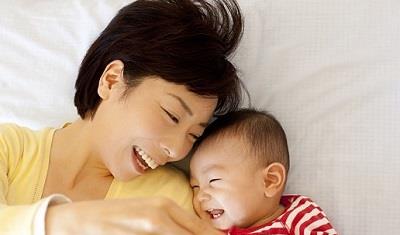For young children, infant education can involve techniques that parents use every day. Parents can stimulate their baby's senses to help develop good limb muscle coordination, memory, and concentration skills.
The term "infant education" may sound strange at first, but in fact it can be an interesting experience in the interaction between a parent and his beloved newborn baby. This term is to show the parent's ability to stimulate the child's thinking.
Teaching children from childhood
Almost all professionals encourage parents to start "teaching their children from an early age". The American Association of Pregnant Mothers states that newborn babies have the ability to perceive a situation by 3 months of age and be able to connect with language between months 7 and 8. Early childhood education doesn't have to begin any month in your baby's life, but it takes time for you to slowly begin practicing with techniques to help stimulate your baby.

Always talk to your baby to understand his parents' love for the baby
How to educate a newborn baby? Most parents immediately think of early childhood education DVDs like Baby Einstein or other educational programs. Recently, these types of DVDs have been met with severe criticism that these types of DVDs distract children and serve only children's entertainment instead of education. However, if you know how to use it properly, this is also one of the useful and convenient tools to help educate your child.
Teach children by stimulating the senses
For young children, infant education can involve techniques that parents use every day. Parents can stimulate their baby's senses to help develop good limb muscle coordination, memory, and concentration skills.
Associating sounds with specific objects is also a skill that your baby can learn: shake a rattle on the side and wait for your baby to turn his head or look at the side of the sound, then shake on the other side or under the feet to train your baby to have a reaction to sounds. This is how you teach your baby to learn through hearing.
For touch, you can also let your baby touch a cup of warm water and a cup of cold water to feel the difference between hot and cold.
There are also many ways for you to stimulate your baby to learn through the rest of the senses such as vision (using colorful toys brought in front of the baby's eyes from a distance), olfactory (giving your baby to smell the scents taste (for your baby to taste the sweet, sour ...)
The best way to educate is to just interact with the baby as much as possible. Repeat the sounds your baby makes to help encourage her to understand the "principle" when talking: one person talks, the other hears and vice versa. In addition, parents can also use singing and storytelling methods to help children learn the differences in tone, words and also increase their vocabulary. Playing games with children is a way to stimulate your baby to move and recognize things around for example, holding your baby's hand on parts of your face such as nose, mouth, eyes, cheeks ... and then placing his hand on the parts similar on the baby's face and name that part to practice the baby with connection and language development.
Create your own ways of interacting and playing with your baby. Children will be able to start learning very early if their parents know how to apply the methods of infant education properly and for the right purpose.












